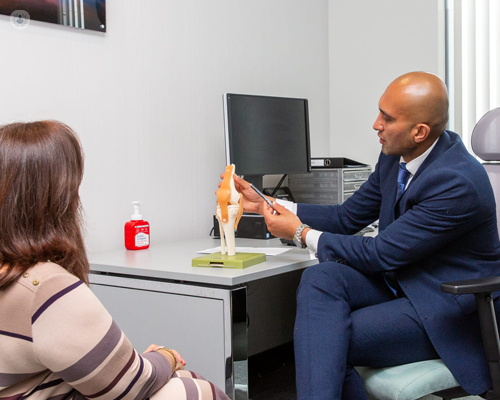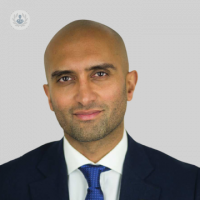Osteoarthritis a pain in the knee? PRP therapy may help
Written by:There are a number of treatments available for knee osteoarthritis. Platelet-rich plasma - or PRP - offers, the possibility of effective, longer-lasting relief for the condition by treating damaged tissues with ingredients from the patient’s own blood.
But what’s involved in the process? Mr Bilal M. Barkatali, a leading specialist in knee surgery and consultant based in Greater Manchester, speaks to Top Doctors about the PRP procedure administered for knee osteoarthritis and just how invaluable it can be for people living with significant pain.

What is involved in PRP treatment for knee osteoarthritis?
PRP treatment for knee osteoarthritis involves a formal assessment by a consultant knee surgeon including physical assessment and X-rays. If the knee osteoarthritis is between grade one and three, then the knee osteoarthritis can be successfully treated with PRP injections.
The process for PRP injections involves drawing around 10 to 15 millilitres of venous blood, usually from the arm. This is centrifuged at around 3,000 RPM, then this usually yields around four to six millimetres of platelet-rich plasma. The knee is then cleaned using alcohol and chlorhexidine mix which kills any bacteria on the surface of the skin and minimising the risk of infection. The PRP is then injected into the knee joint. This can be done either with or without ultrasound control.
Are PRP injections for knee osteoarthritis painful?
No. The PRP injections are no more painful than a steroid or hyaluronic injection. They take only a few seconds to deliver. There is usually a feeling of fullness around the knee joint and for up to a week afterwards the knee can feel a little warm and swollen. This is nothing to be alarmed about and this is part of the inflammatory action of the platelets and is perfectly normal.
How many PRP injections are needed for knee osteoarthritis in order to relieve symptoms?
Usually, a course of three injections is recommended. This depends on the type of PRP being injected. This can be either every two weeks and, in some cases, depending on the PRP type, the injections can be given monthly over a period of three months.
Are there any risks or side effects of PRP injections for knee osteoarthritis?
PRP injections have a very low risk profile. There's been no reported cases of infection following PRP injection. The main reports are of some mild pain or discomfort, and a feeling of warmth or redness after the injection. This is not a negative side effect and in fact shows a biological action happening within the knee joint.
How effective is PRP for knee osteoarthritis?
The effectiveness of PRP depends on a number of factors. There are patient factors such as:
- Weight
- Levels of activity
- General levels of health
- Age
The fitter and healthier the patient, who has a normal BMI, the higher the chance of success of the PRP injections. The effectiveness also depends on the severity of the osteoarthritis. PRP works by maintaining and stabilising the cartilage that's remaining in the knee joint. If the arthritis is extremely severe, i.e., grade four, this indicates there's not enough cartilage left in the knee joint left to preserve and therefore the chances of success are lower.
If you’re considering platelet-rich plasma treatment for your knee osteoarthritis pain, make an appointment with Mr Barkatali via his Top Doctors profile.


